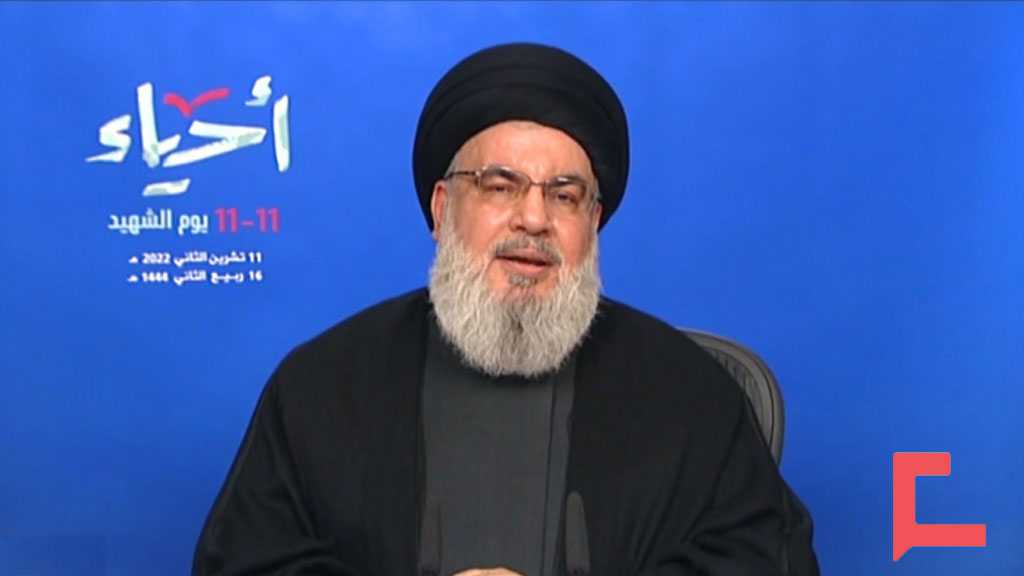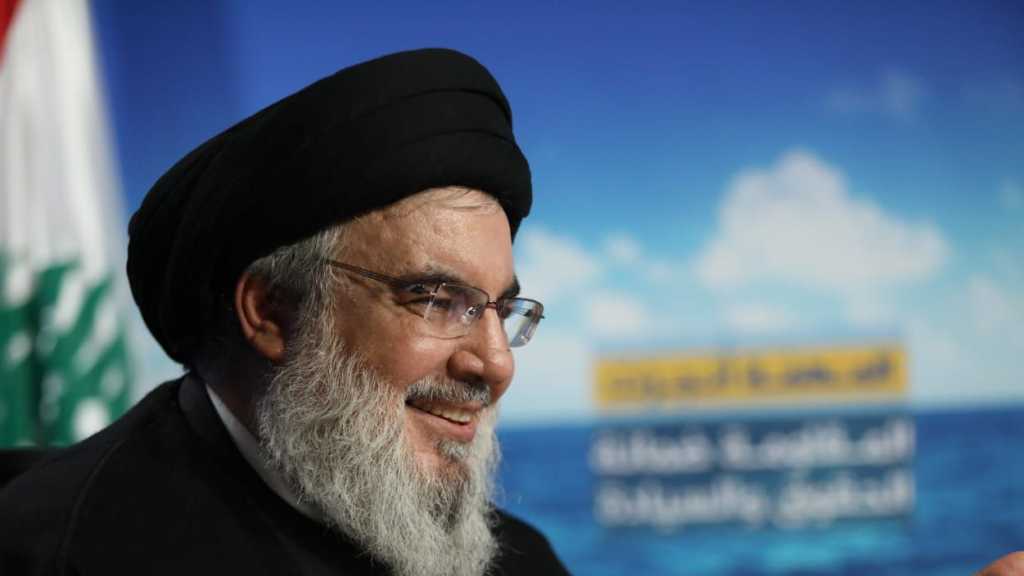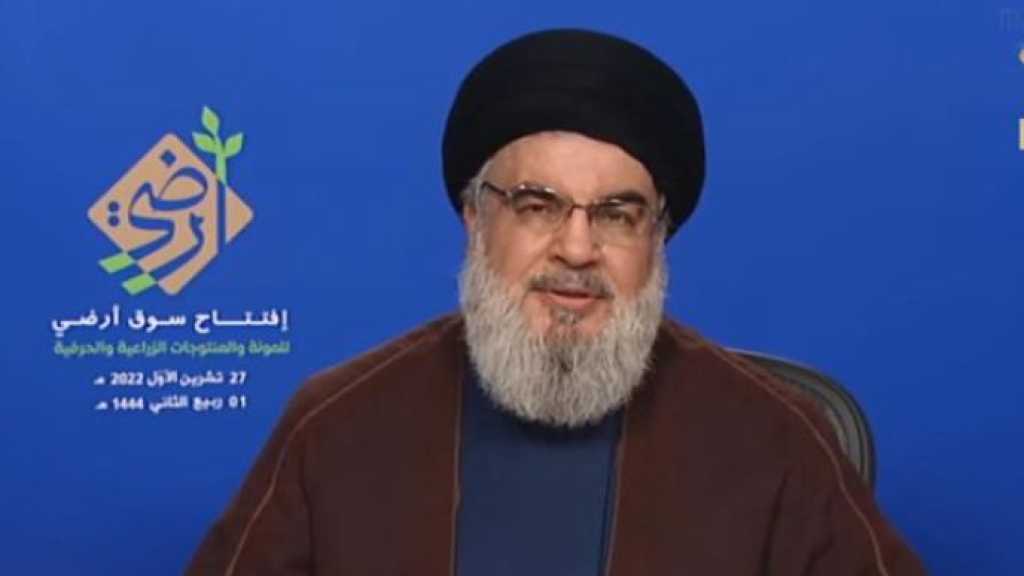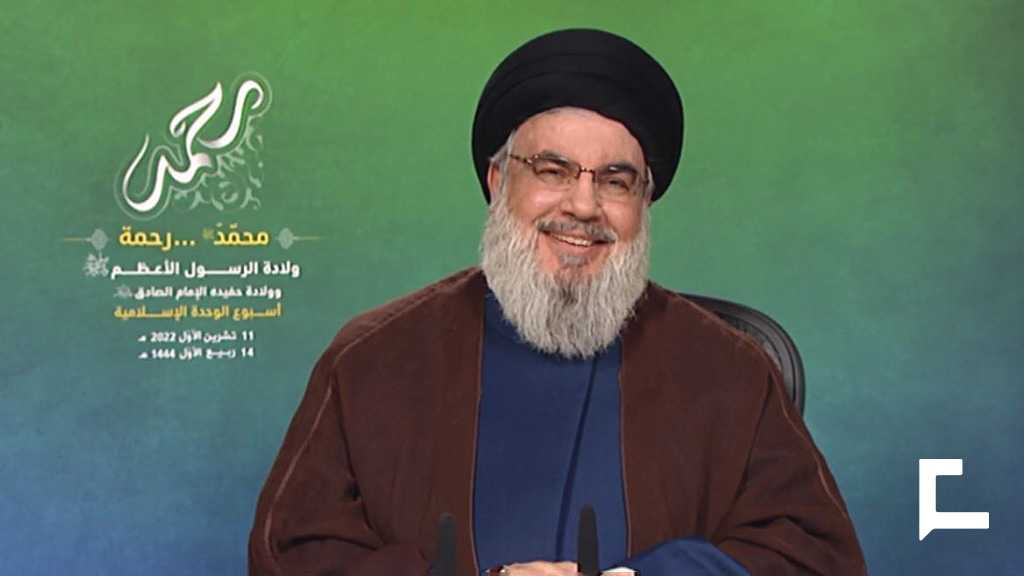Sayyed Nasrallah Slams Int’l Community’s Double Standards Regarding Ukraine: World Silent to US Crimes
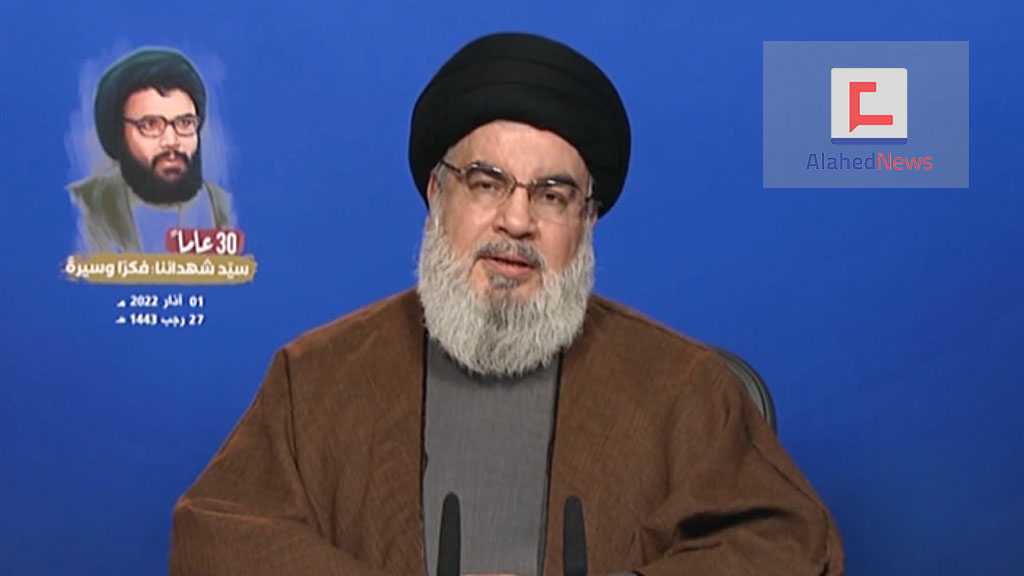
Translated by Al-Ahed News, Live Coverage
Hezbollah Secretary General His Eminence Sayyed Hassan Nasrallah spoke on Tuesday in a conference held on the 30th martyrdom anniversary of martyred leader Sayyed Abbas al-Moussawi.
Sayyed Nasrallah began his address by pointing out to the importance of the conference, saying that its “outcome would form a real beginning which the path of resistance needs after 40 years of its launching.”
“The presented studies, lectures, and discussions will be compiled to documents and books that will in turn be used in our papers,” the SG explained.
His Eminence went on to say, “It is our duty to document the huge sacrifices offered by the resistance men, and the bright truth of the blessed path [of resistance] to preserve it for the future generations.”
The Resistance Leader shed light on the history of the Resistance saying, “What happened in the 1970s and 1980s had been acknowledged and accepted, and this is the path we follow these days.”
In his speech, Sayyed Nasrallah spoke of Sayyed Abbas al-Moussawi explaining that the martyred leader “had a strong belief in the Ummah’s need for a leading jurist or what we refer to as the ‘guardian jurist’ or [Waliy al-Faqih].”
“Sayyed Abbas Al-Mousawi’s logic was based on Islam,” the SG stressed.
His Eminence further spoke of Sayyed Abbas al-Moussawi’s high regard of the role of women in religious education.
“Martyr Sayyed Abbas al-Moussawi had a strong belief in the women’s role in religious education, and that there is a space that cannot be filled but by those female scholars.”
Elsewhere in his speech, Sayyed Nasrallah explained some of Sayyed Abbas’s vision regarding unity and partisan work.
“Martyr Sayyed Abbas was one of the strongest supporters of the formation of a gathering of Sunni and Shia Muslim scholars,” the Resistance Leader explained, adding, “Sayyed Abbas believed in the organizational and partisan work.”
“Martyr Sayyed Abbas was one of the strongest supporters of the formation of a gathering of Sunni and Shia Muslim scholars,” the Resistance Leader explained, adding, “Sayyed Abbas believed in the organizational and partisan work,” as the Martyred Leader was “one of the founders of Hezbollah’s organizational framework.”
Sayyed Nasrallah stressed on the importance of Hezbollah in Sayyed Abbas’s life saying, “Abbas had nothing but Hezbollah. He spent his life, youth, and time for the sake of this path.”
Regarding the Shiite circle, Sayyed Abbas al-Moussawi believed in “the importance and necessity of openness, cooperation and integration, despite the differences,” the Resistance Leader said, reiterating the martyr leader worked “day and night to in order to achieve unity among Muslims” while stressing in the late Sayyed’s belief in “Islamic unity, rapprochement and cooperation among Muslims.”
Hezbollah’s Secretary General said “Sayyed Abbas believed in building a state and participating in political life.”
According to Sayyed Nasrallah, Sayyed Abbas was a people person who “believed in the people, loved them, was humble to them, and trusted them; he also betted on them and served them; not to mention he preserved their dignity and security.”
“Sayyed Abbas believed in participating in municipal and parliamentary elections, as well as integrating in state and government jobs,” the SG stated, emphasizing “that no country can exist without a state.”
The former Secretary General of the Resistance group sought to serve his people, as he believed in the necessity of establishing institutions in Hezbollah alongside the popular organization and the Resistance, Sayyed Nasrallah said.
Elsewhere in his speech, Sayyed Nasrallah focused on Sayyed Abbas’s firm position in eliminating “Israel”, stating that “the martyr leader accompanied the 1st intifada in the eighties, hour by hour.”
To Sayyed Abbas, Iran is “the ‘prophets’ dream’ that came true,” the SG said, emphasizing that “Iran, for him, is the central state.”
The Secretary General continued in his description of Sayyed Abbas’s vision of the society and said, “Distancing oneself and neutrality had no place in Sayyed Abbas’ logic.”
“Sayyed Abbas was carrying the entire nation’s concerns, regardless of the capabilities,” said Sayyed Nasrallah.
Regarding to Sayyed Abbas’s vision of the US, Sayyed Nasrallah said that it is similar to that of Imam Khomeini, which confirms his moto: ‘The US is the Great Satan’.”
To Sayyed Abbas, the US is “an enemy to whom we should neither resort to nor bet on,” the Resistance Leader explained.
Moving on to the development in the Russia-Ukraine conflict, Sayyed Nasrallah cautioned of the dangerous condition regardless of the situation on the ground.
His Eminence urged that lessons should “be learned from the current situation and built upon in our region.”
Pointing to West’s double standards, the Resistance Leader said that “Today, the world respects only the fittest and is silent to US crimes.
“The US stole three and a half billion dollars from the Afghan people’s money amid global silence,” said His Eminence.
The Secretary General held the US accountable for the events in Ukraine, shedding light on the policies it followed to agitate the situation there.
“How did the world behave when America invaded Afghanistan, and how is it behaving now, as Russia started its military operation in Ukraine?” Sayyed Nasrallah asked.
The Resistance chief emphasized that “What is happening poses a lesson for those who trust and rely on the US,” cautioning “Whoever hands over his weapons to others and leans on guarantees from here and there, would later beg for weapons and arms.”
Sayyed Nasrallah concluded his speech by reiterating that “The US, the ‘Great Satan’, is responsible for the ongoing tragedy and dangers.”
Comments
